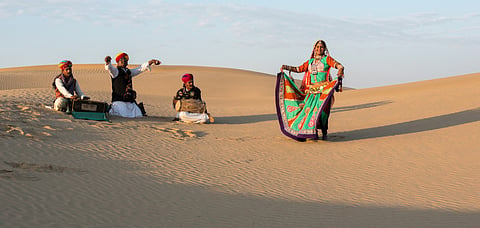
- Destinations
- Experiences
- Stay
- What's new
- Editor’s Picks
- Responsible Tourism
- CampaignsCampaigns
- Subscribe

A project of Rajasthan Tourism implemented with UNESCO, is unleashing the potential of Rajasthan's intangible cultural heritage. Adopting the 'Art of Life' methodology for strengthening cultural tourism in western Rajasthan, 10 cultural tourism hubs are being developed in the districts of Jaisalmer, Jodhpur, Bikaner, and Barmer.
The project will add prosperity to the life of 884 performing artists and 594 handicraft artists of the region and safeguard the traditional artforms.
In an effort to support heritage education and cultural enterprises, an ecosystem is being developed through capacity building and facilitating direct market linkages for folk artists and craftspersons.
Songs of Langas, Manganiyars, Mirs, Kalbelia song and dance, puppetry, pottery, handloom, durrie, jutti, kasidakari embroidery, applique work, and other crafts that were once part of day to day life of local folks have now become limited to few families that carry on the tradition. These artforms, however, charm the visitors as much as the royal palaces and majestic forts. The UNESCO and Rajasthan Tourism collaboration envisions to promote these arts on a global platform and connect the artists with admirers of their work.
Under the ambit of cultural tourism, the art for life links culture with skilling, enterprises and economic development. The selected sites are close to famous tourist sites and other attractions in nearby areas and by developing these artist clusters the nearby tourist circuits will offer a different experience to the visitors.
The development of cultural tourism hubs also ensures due recognition of the art and artists, thus helping to establish their social identity and garner respect. It assures a new lease of life and develop new business for the dhurrie weavers of Salawas in Jodhpur, jutti and kasidakari artists of Patodi in Barmer, potters of Pokhran in Jaisalmer & Sangsani in Jodhpur.
In the villages, tourists will be able to witness the making of local handicraft products that have been in great demand in the international market. Similarly, the music villages of Barnawa Jageer and Sheo tehsil in Barmer, Barna, Janra, Hamira in Jaisalmer, Phalodi region in Jodhpur and Pugal in Bikaner offer visitors an experience of desert tunes of Rajasthan. Chopsani in Jodhpur with its Kalbelia song, dance and craft and Bikaner with its painting like Usta Art and weaving traditions at Napasar certainly add to the enriching cultural experience of the desert in western Rajasthan.
